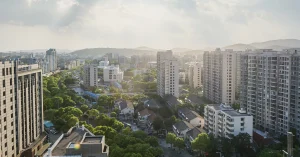The global retail industry has been bearing the brunt of a downward spiral in the last 5 years. This is owing to the multipronged detrimental effects of the pandemic, inflation, socio-political upheaval in the international community, and the resultant lower purchasing power of consumers.
Table of Contents
However, one economy that has not only been able to withstand the global downturn but has continued on its upward trajectory of growth is that of India. Famously dubbed as the ‘Global bright spot’ in an internationally dreary economic climate by the International Monetary Fund, the 5th largest economic power in the world is well on its way to the lead of the ‘Global South’.
India’s thriving economy has provided a strong framework for its retail sector to boom. According to the internationally acclaimed consultancy firm Kearney, the retail sector in India is projected to grow by $1.4 trillion by 2026 and $1.8 trillion by 2030.
Top Factors Behind the Booming Retail Industry in India
Let us have a look at what factors are the vehicles behind this accelerated growth in the retail sector in India. This will allow you to clearly comprehend why investing in retail real estate assets in India is your best bet.
The country’s population demographics:
It is a well-known fact that the growth of the retail sector is directly proportional to the consumption potential in the region. India in 2023 has positioned itself as the most populated country in the world, overtaking China.
The country has a relatively young populace, with the median age being merely 29, in addition to a rapidly expanding middle class with rising per capita income. This section of the population is constantly on the lookout for better and elevated lifestyle options, owing to the increasing urbanisation and exposure to the Western markets through digital media.
A culmination of these factors has led to high domestic consumption that accounts for 60% of the GDP and a seemingly perpetual augmentation of demand for retail spaces.
Changing consumer behaviour
With a rising disposable income and a proliferating middle class, consumer behaviour has changed extensively. When a consumer walks into retail avenues these days, they are not only focused on the merchandise but rather expect to be the recipient of an experiential service.
This trend has been further bolstered by the pandemic, during which everyone had to be cloistered in their living space, and had to completely rely on e-commerce, which is focused primarily on the selling of merchandise.
Retail spaces consist of paramedical stores, high street retail, cafes, etc, and provide consumers with a social framework to interact. Thus, today we are witnessing an epoch of experiential shopping avenues, which invite customers back again and again and increase footfall.
Far from the fears of e-commerce relegating tangible retail avenues to the shadows, discerning retailers have managed to utilise technological advancements to their advantage. From inviting billboards to faster checkout systems, technology has been streamlined into the retail sector seamlessly.
The future of retail is not a battle between tangible stores and their online counterparts, but rather an intelligent confluence between the two in a complementary mechanism.
An Investor-Friendly Ecosystem
Historically, when it came to investing in real estate, residential real estate was seen as the safest, low-risk investment. However, with the ushering in of a new era of transparency in the real estate sector in India, investors have started to turn their attention to a more sophisticated commercial asset class, with a higher rental yield.
The government of India has striven in the last decade to liberalize the foreign direct investment policy, and the establishment of RERA has served to further instil a sense of confidence in the investors. As a result, FDI in India witnessed a record-high inflow of $84,835 million in the financial year 2020-21.
With the government’s initiative of allowing 100% FDI in single-brand and 51% in multi-brand, numerous global investment players are now keener to invest in the Indian retail market than ever. The fact that the retail real estate sector in 2022 witnessed a 25% rise in new retail spaces opening as compared to the previous year, according to CBRE, is a trend that is projected to continue.
Tier 2 and 3 Cities
In recent years, as a result of numerous government initiatives, tier 2 and 2 cities have emerged as significant growth hubs in India. With an impressive intercity and intracity transit system, strong residential catchments, and a strong infrastructure consisting of world-class social institutions, they are now strategically propelled as an ideal investment hub.
Such thriving catchments surrounding booming micromarkets are the perfect elements needed for retail avenues to thrive. Here you can invest in a promising locale at a relatively lower purchase price or rent with lower operational costs as well.
Today, India is on the verge of soaring as a globally dominating economic force. With the shifting global supply chains to India, in light of mounting tension between the USA and China, the country’s explosive economic status and stable democratic parliamentary governance have made the country an investment haven.
Conclusion
One of the most promising retail plots to invest in is the Tathastu realty by Ganga Realty. Envisioned as a buoyant residency, with living spaces meant to elevate your life in every manner, Tathstu is located on the main Sohna road. This strategic locale in the vicinity of the business district vaunts being home to numerous acclaimed global enterprises and has seamless connectivity to commercial hubs of Delhi and central Gurugram. With the promise of Ganga behind it, investing in these retail plots is sure to be an advantageous investment for you.








